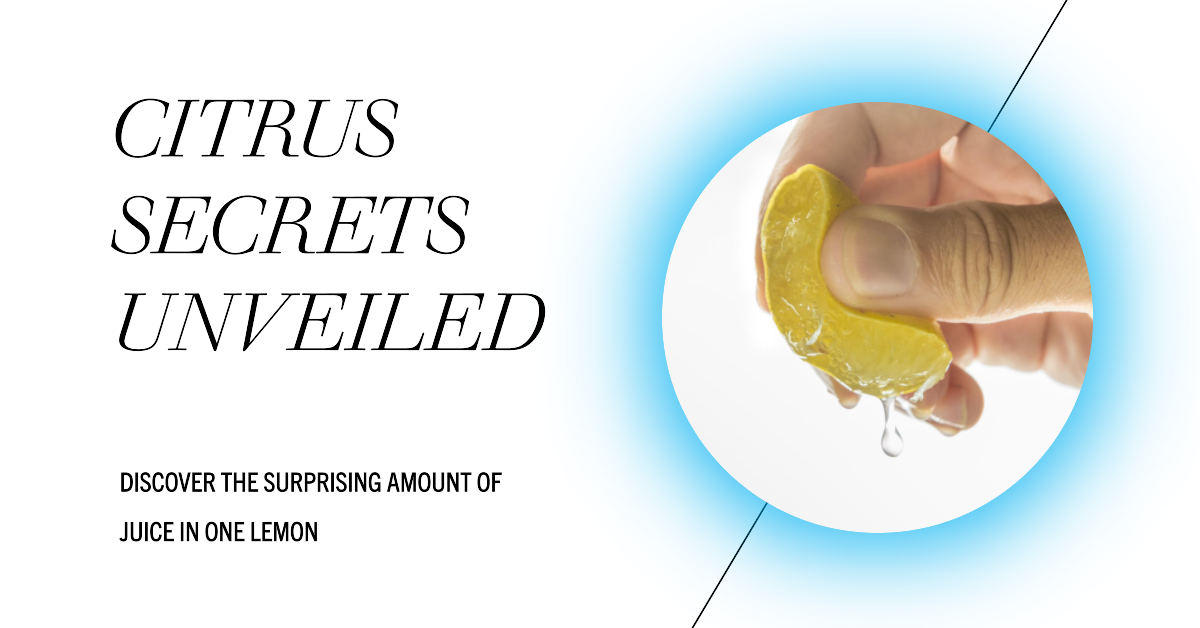Lemons are not only a delightful addition to recipes, but they also boast a refreshing tang that elevates various dishes and beverages. If you’ve ever wondered about the juice content of a single lemon, you’re not alone.
In this comprehensive blog post, we’ll dive deep into the world of lemons and uncover the secrets behind how much juice you can expect from one lemon.
Whether you’re a culinary enthusiast or simply curious, this article will provide all the information you need without visiting multiple sources.
Understanding Lemon Varieties:
Before we delve into the juice content of lemons, it’s essential to recognize that different lemon varieties exist. This discussion focuses on the average lemon commonly found in grocery stores.
- Eureka lemons are the most prevalent variety in the United States and are easily identifiable by their bright yellow color and oblong shape.
- Lisbon lemons are nearly identical to Eureka lemons but are often larger and have slightly thinner skin.
- On the other hand, Meyer lemons are a cross between lemons and mandarin oranges. They have a distinct, rounder shape, a deep yellow-to-orange color, and a sweeter flavor profile.
When it comes to juicing, the differences between these lemon varieties are minor, and you can expect similar juice yields from each. However, if you have the option, Meyer lemons can add a unique sweetness to your dishes and beverages.
The Average Juice Yield of One Lemon: How Much Juice in One Lemon?
A standard-sized lemon contains approximately 2 to 3 tablespoons of juice. This amount can vary depending on the factors mentioned above. It’s always a good idea to pick ripe, medium to large-sized lemons at room temperature for maximum juice yield.
Remember that the average juice yield can vary from lemon to lemon and is influenced by factors such as the lemon’s variety, growing conditions, and ripeness at harvest time. If you need a specific amount of lemon juice for a recipe, it’s a good practice to have a few extra lemons on hand in case one doesn’t yield as much juice as expected.
Three Factors Affecting Juice Content:
Several factors can influence the amount of juice present in a lemon:
a. Size:
Naturally, more enormous lemons are expected to yield more juice than smaller ones. The size of lemons can vary, so it’s a good idea to compare different ones and choose the plumpest and heaviest for juicing.
b. Ripeness:
Ripe lemons are juicier than unripe ones. The juice content increases as the fruit matures. When squeezed, ripe lemons will have a bright, consistent color and yield slightly to gentle pressure. Avoid using lemons with soft spots or wrinkles, as they may be overripe and have reduced juice content.
c. Temperature:
Lemons at room temperature produce more juice than those stored in the fridge. When lemons are refrigerated, the cold temperatures can cause the juice cells to contract, making it slightly harder to extract the juice. To maximize juice yield, leave lemons at room temperature for about an hour before juicing them.
Getting the Most Juice Out of a Lemon:
To extract the most juice from a lemon, follow these handy tips:
- Roll the Lemon: Roll the lemon on a hard surface using your palm before juicing. This helps break down the internal membranes and release more juice. Applying gentle pressure while rolling the lemon will further aid in this process.
- Apply Pressure: Firmly roll the lemon between your palm and the countertop while applying pressure to get the juices flowing. Doing this make the lemon softer and more pliable, making it easier to extract the juice.
- Cut and Squeeze: Cut the lemon in half and use a citrus juicer or reamer to extract the juice efficiently. Hold the lemon half cut-side down and press firmly while rotating the lemon to extract every drop of juice. If you don’t have a juicer or reamer, you can also use a fork to press and twist the lemon to release the juice.
For added convenience, you can also use handheld or electric citrus juicers, making the juicing process even more effortless. These tools are designed to extract maximum juice while minimizing effort.
Creative Uses for Lemon Juice:
Lemon juice’s versatility extends beyond culinary applications. Here are some creative uses:
- Natural Cleaner: Lemon juice’s acidity makes it an effective natural cleaner for cutting boards, countertops, and stains. Mix lemon juice with equal parts water in a spray bottle to create a safe and chemical-free all-purpose cleaner.
- Freshen Fruits and Vegetables: Sprinkle lemon juice on sliced fruits and veggies to prevent browning. The citric acid in lemon juice acts as an antioxidant, preserving the color and freshness of your produce.
- Tenderize Meat: The acid in lemon juice can help tenderize tougher cuts of meat. Marinate meat in a mixture of lemon juice, herbs, and spices for a few hours before cooking to enhance its tenderness and flavor.
- Flavor Enhancer: Lemon juice adds a bright, zesty flavor to sweet and savory dishes. Use it as a finishing touch to soups, salads, grilled meats, and fish to elevate their taste.
- Refreshing Beverages: Lemon juice is a crucial ingredient in classic lemonades and refreshing summer beverages. Mix it with water, sugar, and ice to create a simple and delicious thirst-quencher.
Final Words
Lemons are an excellent addition to any kitchen, and knowing how much juice you can extract from one lemon is valuable for cooking and beyond. By understanding the factors affecting juice yield and applying some simple techniques, you can make the most of these zesty citrus fruits.
Experiment with different lemon varieties, try various juicing methods, and explore the many creative uses of lemon juice in your everyday life. Using lemons for cooking, cleaning, or enhancing flavors will undoubtedly add freshness to your life.
So, the next time you’re in the kitchen with a lemon, you’ll be armed with the knowledge to unlock its citrusy secrets and make the most of its juicy goodness. Happy juicing and experimenting with these delightful citrus secrets!

